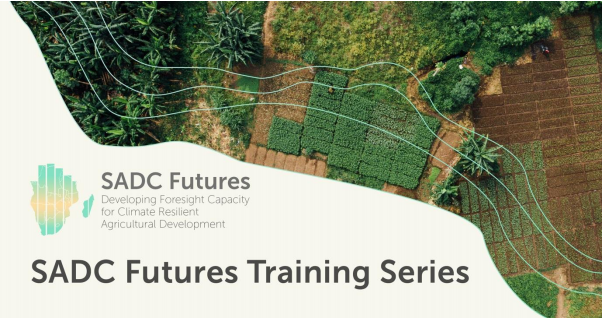CCARDESA Launches the SADC Futures Foresight Training Webinar Series

“The Foresight approach is something we all need now to plan for climate-resilience, agriculture and natural resources management. It helps us to understand the potential implications of these uncertainties, recognize the areas that need to be strengthened, and build strategies for the future”, re-echoed Dr Simon Mwale the CCARDESA Programmes & Grants Manager. He was speaking on behalf of the CCARDESA Executive Director Dr Cliff Dlamini at the official launch of the SADC Futures Foresight Training Webinars which was held on 17th June 2020.
Dr Mwale stated that the agricultural environment is unpredictable and is faced with an unpredictable situation. He mentioned that water scarcity in the region and recent locust outbreaks in Namibia, and South Africa are examples of climate-related risks.
Dr Mwale reiterated how climate change had escalated, making the production of food expensive. The loss of life during the IDAI cyclones and flooding, which have become more frequent makes ignoring the effects of climate change difficult. There have also been outbreaks of plants and animal diseases such as locusts, Fall Armyworms and Foot and Mouth diseases among others, which have caused food and financial loses, affecting both commercial and small-scale farmers.
He further added that the world had witnessed the advent of the most recently COVID-19 outbreak, which has affected the region. Though the Southern Africa Region has been recognized for its rapid response; the outbreak was and still is a critical set back to the functioning and economy of the agricultural system. The sudden epidemic has led to diminished productivity of farmers, pastoralists and fishers, food that never made it to market, and subsequently impacted food and nutrition security as well as businesses.
The environment is more vulnerable now than before. He stressed that the foresight training could not have come at a better time than this when understanding and predicting the potential impact of Climate Change and anticipate its mitigation is a must.
Dr Mwale thanked all participants for attending the webinar and hoped that the training would enable them to be part and parcel of shaping the future of sustainable agriculture.
The first in a series of training concentrated on the first aspect of Foresighting which detailed the context in which the foresight is implemented. The polls before the meeting showed that 50 % of participants saw the future as unpredictable and uncertain, making the training appropriate and relevant.
The facilitators included Sabrina Chesterman, Constance Neely, Romy Chevalier and Pier Andrea Pirani from CCAFS who will continue facilitating the next five more training in the next couple of weeks. The training session was extremely interactive.
Building resilience to emerging agricultural risks, including climate change, as well as environmental and transboundary pests and diseases, is a crucial priority in CCARDESA’s new Strategic Plan. In line with this, CCARDESA is implementing a range of initiatives with different partners to address these issues. These initiatives include the SADC/GIZ project on Adaptation to Climate Change in Rural Areas, the EU funded CAADP-XP4 (financed through IFAD) and the World Bank-funded Agricultural Productivity Programme for Southern Africa (APPSA). This training series which was attended by a total of over 75 participants is a joint initiative of the SADC Secretariat’s Food, Agriculture and Natural Resources (FANR) Directorate, the Centre for Coordination of Agricultural Research and Development for Southern Africa (CCARDESA), the International Livestock Research Institute (ILRI) through the CGIAR Research Program on Climate Change, Agriculture and Food Security (CCAFS) and German Development Cooperation facilitated through the SADC / Deutsche Gesellschaft fur Internationale Zusammenarbeit (GIZ) GmbH ‘Adaptation to Climate Change in Rural Areas’ programme (ACCRA), funded by the German Federal Ministry for Economic Cooperation and Development (BMZ).

























































